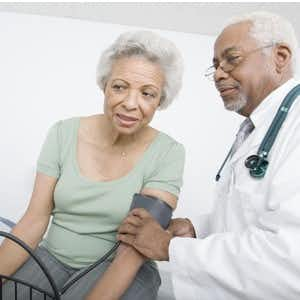
Millions of Americans may be shocked to learn that they have high blood pressure according to the latest guidelines from the nation’s cardiologists. The American Heart Association and the American College of Cardiology collaborated in establishing new criteria for hypertension. These were presented on Nov. 13, 2017, at the American Heart Association annual meeting and published in both Hypertension and the Journal of the American College of Cardiology.
Previous guidelines urged doctors to treat patients whose blood pressure measured 140/90 or higher. The first and higher number is systolic blood pressure: the pressure within the vascular system when the heart is squeezing blood through it. The second number, diastolic blood pressure, is the pressure remaining while the heart relaxes between beats. Under the new criteria, blood pressure at or above 130/80 is defined as high blood pressure. Most people at that measurement will need to take steps to reduce it.
Why the Change In Defining High Blood Pressure?
The lower threshold appears to flow from a study called SPRINT that was published two years ago. It showed clearly that people who were able to lower their systolic blood pressure close to 120 were 25 percent less likely to have a heart attack or a stroke. In absolute terms, the difference did not look enormous: 1.65 percent of those getting systolic blood pressure down near 120 had a cardiovascular complication compared to 2.19 percent of those whose systolic blood pressure was lowered only to 140. Still, when you consider how many millions of us (approximately 103 million) have blood pressure at or above 130/80, a little difference can add up to an awful lot of people. Avoiding a heart attack or stroke will be a huge benefit for them.
What Will the New Guidelines Mean for You?
The new guidelines will urge treatment for anyone whose ten-year risk of a heart attack or stroke is 10 percent or more. That will include most people over 65, whose age alone puts them at risk of problems within the next decade. But younger people with additional risk factors such as diabetes or kidney disease will also qualify for antihypertensive treatment.
Measuring Blood Pressure:
Doctors and nurses may have to change the techniques they use to measure blood pressure at an office visit. The new guidelines recommend that patients be given at least five minutes of rest time before the measurement is made. No decisions are to be made on a single measurement; at least two, from two different office visits, are required for diagnosis. And patients are encouraged to monitor their own blood pressure at home. (You can find more information on proper blood pressure measurement technique here.)
What Should You Do About High Blood Pressure?
Not everyone who meets the definition of hypertension will need medication immediately, but no doubt many people will. It is possible to lower blood pressure without drugs, but it requires diligence and effort: exercise, meditation and a DASH diet with plenty of vegetables and fruits can work. To learn more about how to lower your blood pressure naturally, as well as the pros and cons of blood pressure pills, you may wish to read our Guide to Blood Pressure Treatment.
9/2/19 redirected to: https://www.peoplespharmacy.com/articles/was-your-blood-pressure-measured-incorrectly/

